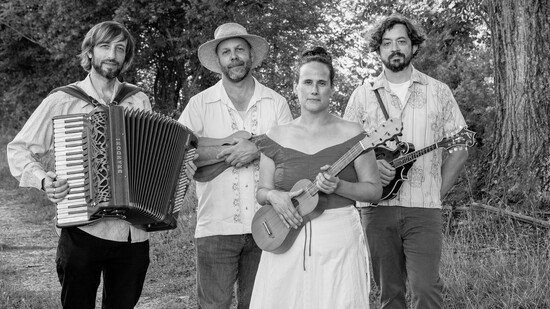Estela Diaz Knott and David Berzonsky met through music nearly three decades ago and have traveled extensively around the globe. One location that they've traveled extensively is Central America, from where Knott’s mother hailed before she moved to Appalachia, where Knott was raised. Both Knott and Berzonsky have Appalachian heritage as well as a shared love of storytelling through music and exploring their individual identities in addition to Appalachian roots -- hers, Mexican, and his, Jewish. After a storied start to the first years of their relationship that took them from Latin America to Berkeley, California, the two started the band Lua Project before ultimately landing in Charlottesville and continuing their style of music that they call Mexilachian.
While the two, along with their band, combine a wide range of musical styles, their most recent album is a compilation of stories born from interviews with families of Latine descent that have settled in Appalachian regions. The team worked together, with Knott doing much of the lyrical writing and Berzonsky contributing largely to composition, to document the oral histories through song. And, as always, they collaborated with the other band members, including their daughter Luna, to bring the stories and music together.
In addition to playing at local venues as well as around the country, the Lua Project also teaches early childhood classes, organizes community events and outreach efforts, and offers workshops. And while Knott is dedicated to the pursuit of compelling storytelling and music-making with Lua Project, her own favorite song is a moving one titled Gracias a la Vida (Thank You to Life), sung by Mercedes Sosa, who Knott said, “carried the voice of the people.”
To experience the work of the Lua Project and find where they’re performing, visit LuaProject.org.
Estela Diaz Knott on Being a "Cultural Pollinator"
I'm second generation, and I know about growing up where no one was like me -- I craved to be around people like me. Over time, I started to realize, as I was running back and forth between here and there, I’m a bridge -- I’m a connector. And that’s what I really want to be. I realized there are a lot of people who feel that way.
So if there’s a way that we can weave people’s stories together, so they realize they don’t need to fit into one box, that's what we want to do. You can be Mexilachian -- your people can be here and belong. Cultural traditions aren’t static; they evolve over time. I hope it inspires to look inside us, and see the culture that we share as Americans.
